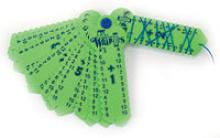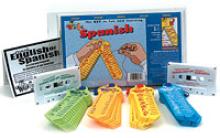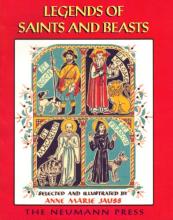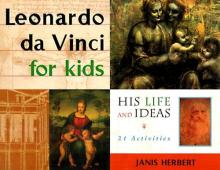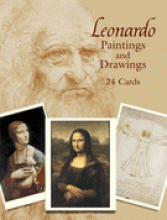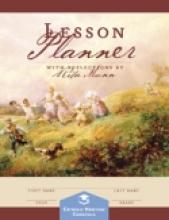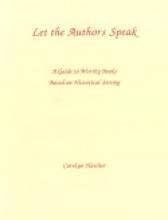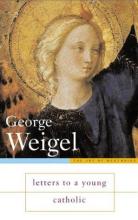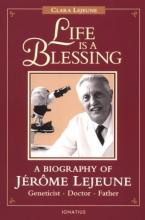No name
Learning Wrap-Ups: Basic Math Introductory Kit
These colorful key-shaped plastic flash cards allow students to practice basic Math skills by wrapping a string around the ribbed edges of each card to identify the correct answer. (Cards are attached together on a pivot point in groupings of 10 cards organized by operation.) The cards are cleverly self-correcting – when the child finishes each card, they simply flip it over; when all answers are correct, the string will match the diagram on the back of the card. The basic operations sets are simple equations where you match the equation to the correct answer. For the fractions set, you are matching equivalent fractions – pictures to fractions, pictures to pictures and fractions to fractions – plus a few simple equations which involve adding and subtracting fractions.
We have found this to be a great way for our children to practice their basic math facts. They are colorful and appealing and offer a welcome change from regular book-work.
Please note when ordering this product that there are many varieties of this product – some including CDs or workbooks, or even large classroom size sets. The set reviewed here retails for about $45-$50 (in 2024) and contains 5 flash-card sets – Addition, Subtraction, Multiplication, Division and Fractions.
Also see the Learning Wrap Ups website for more details and an animated demo.
Another reviewer (Suchi Myjak) notes: One of my sons is a highly visual learner, so much so that he managed to memorize the patterns that the strings made on the fronts of the keys. He could "do" the wrap-ups incredibly fast, but was not actually learning the facts. Parents may want to occasionally check the student's math facts in some other way to ensure that they are really getting learning. The wrap-ups did work well for my other children.
Learning Wrap-Ups: Spanish Introductory Kit
Our family has been enjoying Learning Wrap-Ups in a variety of subjects to drill and practice basic concepts. Each set consists of ten key-shaped plastic flash cards attached at a pivot-point with a string to wrap back and forth from question to answer. After finishing each key, simply look at the back to be sure the string matches up with the self-correcting answer key. I love how my children can study independently with these sets AND they can be used over and over again. They are sturdier and more self-contained than ordinary flash-cards (and don't get lost under the couches!). Learning Wrap-Ups may be purchased one set at a time or in money-saving multi-set kits.
The Spanish Introductory Kit includes four flashcard sets:
Learning Words: Each of these cards involves matching pictures to Spanish words. Subjects covered are: parts of the body, school words, clothing, food, animals, family members, household objects, outdoors and transportation.
Talking Basics: Match numerals, symbols and pictures to Spanish words. Some are in the format of simple fill-in-the-blank sentences. Subjects covered: counting, months of the year, action words, miscellaneous objects, more parts of the body, opposites, directional words, holidays and week days, and telling time.
Making Statements: This set uses simple fill-in-the-blank sentences to practice vocabulary in the following subject areas: fruit, things you can read about (also practices plural endings), miscellaneous objects (while practicing using "an" before vowel words and using "a" before consonant words"), things we wear, objects in a living room, more action words, money and stating a need.
Asking Questions: Topics include: Observing zoo animals, tools and equipment, occupations, places, science class materials, vegetables, miscellaneous nouns, bathroom items, kitchen items, and shopping.
The pocket-sized 31 page booklet provides the English translations for each of the Learning Wrap-Ups (the Wrap-Ups themselves do not use any English). We've found this to be a great place to start studying (particularly when I'm doing things with my children in a group). My children line up and enjoy acting out the Spanish words while they're learning them. The booklet is really handy for oral quizzing as well. The children go back to the Learning Wrap-Ups for independent study. The set also includes two audio tapes. (We haven't really used these yet as we tend to do our oral work together. I'm sure it will be handy for further independent study at some point.)
Kit includes: 4 sets of plastic flash cards, one teaching booklet and two audio tapes
This product was donated for review by Learning Wrap-Ups Inc.
Legends of Saints and Beasts
What a lovely book! Legends of Saints and Beasts retells the stories of four saints and their associations with animals. Included in this beautiful hardbound collection are the stories of Saint Jerome and the lion, Saint Roch and his dog, Saint Francis and the Wolf, and Saint Macarius and the hyena. The text is written in a decorative style in which capital letters are colored in a pattern reminiscent of medieval texts, and the colorful line-drawn illustrations are charming. The choice of vocabulary also has an old-world feeling to it that adds a great deal to the stories' style but puts the independent reading level probably from fourth grade and up. The final three pages of the book contain more detailed background information about the lives of these saints, making this an even more special book. Highly recommended!
Copyrights 1954/2000
Leonardo da Vinci for Kids: His Life and Ideas
Leonardo da Vinci has long been considered the paradigm "Renaissance Man". Through this book, he offers children a great example of enthusiastic love of life and learning. Readers will come away with a greater perspective on and respect for many important ideas: the importance and joy of learning, early advancements in science, general concepts of art and how to appreciate it, basic scientific concepts, ideas for using the imagination and memory, concepts in math relating to science, Renaissance life and much more.
I was impressed with the care the author took in relating so many interesting ideas in an accessible and engaging manner. I found difficult concepts handled graciously and respectfully - particularly for the intended age level. For example, the reader will learn that da Vinci's parents were never married and that this had consequences on his career choices. We learn that da Vinci dissected dead bodies at the morgue for the sake of artistic and scientific learning. At one point the Pope prohibits him from continuing this mode of study. Instead of being judgemental about these sorts of issues or dwelling on them inappropriately, they are explained in clear, simple terms as relevant parts of the story, but without any extra nonsense.
This would make an excellent "spine" text for a study of the Renaissance. In addition to the text and side bars, there are 21 activities relating in various ways to da Vinci's life. They span a wide range: baking, drawing, math, science, painting, observing, language and more. The book is best for independent reading in 6th grade and up. It could be read-aloud to younger children. Most of the activities are suitable for any school-age children.
Enthusiastically recommended!
Donated for review by Chicago Review Press
Leonardo Paintings and Drawings: 24 Cards
24 Postcards in perforated book
Most homeschoolers are familiar with the Montessori-style idea of having children learn to enjoy and appreciate great paintings by studying small post-card size reproductions (especially as promoted by Aline Wolf in Mommy It's a Renoir). This is a very nice program, as I understand it, but I've been frustrated with the lack of beautiful painting collections in postcard size. You can find them here and there at museums, but they have been very difficult to purchase on the web or from catalog. Dover Publications is beginning to fill that gap with some beautiful postcard collections, but Leonardo is my favorite so far.
The set includes 13 reproductions of paintings: Madonna with the Carnation (1475), The Virgin and Child with St. Anne (1508), Bacchus (circa 1513), Portrait of Ginerva de'Benci (circa 1478), The Last Supper - detail (1495-1497), The Benois Madonna (circa 1478), The Annunciation - detail (circa 1472), St. John the Baptist (circa 1513-1516), Portrait of Cecilia Gallerani a.k.a. Lady with an Ermine (circa 1490), Madonna of the Yarnwinder (1501), Madonna Litta (circa 1490), Mona Lisa (1503-1506), and Portrait of a Musician (circa 1490).
There are 11 beautiful drawings as well: The Virgin and Child with St. Anne, Profile of a Young Woman, Antique Warrior, Self-Portrait, Five Grotesque Heads, The Virgin of the Rocks, Vitruvian Man, Study for the Last Supper and Architectural Sketches, Old Man and Youth, Study for the Battle of Anghiari and Feminine Headdress.
This is a great and inexpensive way to introduce children to really great art. Also would make a nice supplement to Leonardo da Vinci for Kids.
Lesson Planner
Can a practical, hard-working tool designed for everyday use also be inspiring and elegant? The CHC Lesson Planner is just such a tool. Developed to be used with the CHC Middle School Lesson Plan Guide, it is completely useful at any grade level and with any curriculum. This inexpensive plan book is consumable and designed for all subjects for one student for one academic year. This unusual feature supports the CHC philosophy that a student should gradually grow into independent study; having their own planner helps the student to take pride in their growing ability to work productively and independently. The Planner is specifically for a Catholic teacher and student, with reminders of Feast Days in the planning reminders and other Catholic references throughout.
Clear, uncluttered pages are printed using an easy-on-the-eye brown ink. They are spiral bound in a lay-flat presentation with a "jelly-proof"cover. The inside covers concisely lay out the CHC curriculum suggestions for grades 5-8. The Planner is designed for four nine-week quarters and begins with a "Welcome" section that provides help and advice for the start of a new school year. Warm and encouraging, there are specific suggestions for the entire family as well as the middle school-aged student. Each quarter's section begins with a well-organized planning guide, an independent study chart (described in the Middle School Lesson Plan Guide in detail, but a completed sample is provided), and a motivating reflection for the homeschool teacher to ponder throughout the quarter. Each school week is laid out on a two-page spread with a grid for 8 subjects or goals over 5 days. A sample of a completed week is provided. Each week's spread also includes a section for notes and, my favorite, a motivational reflection that is either a helpful hint, useful advice, or a Biblical quotation. This book helps to make planning an enjoyable task as well as a concise documentation of the student's work for the entire school year.
Let the Authors Speak
The introductory chapters (18 pages) provide an excellent, down-to-earth, discussion of the importance of reading good books, and other worthwhile aspects of the educational philosophies of Charlotte Mason. This introduction is probably worth the price of the book even without all the subsequent book lists! This book provides a helpful resource in adding good books to a history course and excellent background reading on educational philosophy for parents.
Letters to a Young Catholic
In this small bok, author George Weigel takes us on a journey around the Catholic world, both literally and figuratively. Weigel had the idea to present each different aspect he wanted to discuss with young adult Catholics (and any adult interested in learning a little more about the Faith) by taking his book reading companions on a journey to several noted Catholic destinations, such as Chartres Cathedral in France, the Sistine Chapel in Rome, and various destinations in Poland and America. At each location, Weigel stops to discuss some aspect of Catholic Christianity with his reader.
Weigel begins by telling the reader a little bit about his own upbringing as a Catholic boy in Baltimore. He spends a chapter talking about an energetic parish in South Carolina, and why the pastor, a convert, has succeeded in making the parish dynamically orthodox. Weigel spends time in England with G.K. Chesterton, another convert, and uses a number of Chestertonian quotes to talk about the faith. Flannery O'Connor, too, emerges as one of Weigel's favorite authors, and her quotes are funny, pithy, and speak to the heart.
The author's discussion of redemptive suffering, Theology of the Body, the use of icons and much, much more, make this a book I recommend to all young, and not-so-young Catholics.
You can read a chapter from the book at the Catholic Educator's Resource Center.
Also available in softcover published by Perseus
originally appeared in Heart and Mind Magazine, Spring 2005 - used with permission
Life is a Blessing
Written by his daughter, this book brings us a portrait of a great Christian, loving husband and father, and devoted son who was also one of the greatest scientists of the 20th century.
As a pediatrician, Jérôme Lejeune saw many patients with Down syndrome. Seeking to help these beloved patients and their families, he succeeded in tracing the cause of Down syndrome to an extra 21st chromosome. He could have named the genetic anomaly after himself, but with his characteristic humility, he named the condition "Trisomy-21," meaning three 21st chromosomes (instead of two). While his work did succeed in removing the stigma from Downs (it had previously been thought that maternal syphilis caused it), Lejeune was heartbroken to see his discovery turned into a weapon against the little ones he loved so much.
Further discoveries in the field of genetic medicine followed, including Trisomy-13 and monosomy-9. But despite his pioneering work, which opened up the field of genetically-based diseases, he was never awarded a Nobel Prize, likely due to his unwelcome pro-life views. There was worse to come. Because of his defense of the innocent and defenseless, Lejeune found himself increasingly sidelined. Nevertheless, he continued to bear a hope-filled Christian witness, forgetful of self, a shining example to us all.
Toward the end of his life, Dr. Lejeune worked to found the Pontifical Academy for Life and was (very briefly) its first president. He died on Easter Sunday, a circumstance in which his friend Pope St. John Paul II found a particular significance.
A beautiful book about a great man.
 Originally published in French by Criterion, Paris, 1997.
Originally published in French by Criterion, Paris, 1997.
A newer edition of this title has been published by the Catholic University of America Press in 2022 for the National Catholic Bioethics Center and the Jérôme Lejeune Foundation. This edition's ISBN is 9780935372595. It is only $7.95 direct from the publisher, less than half the current Amazon paperback price.

